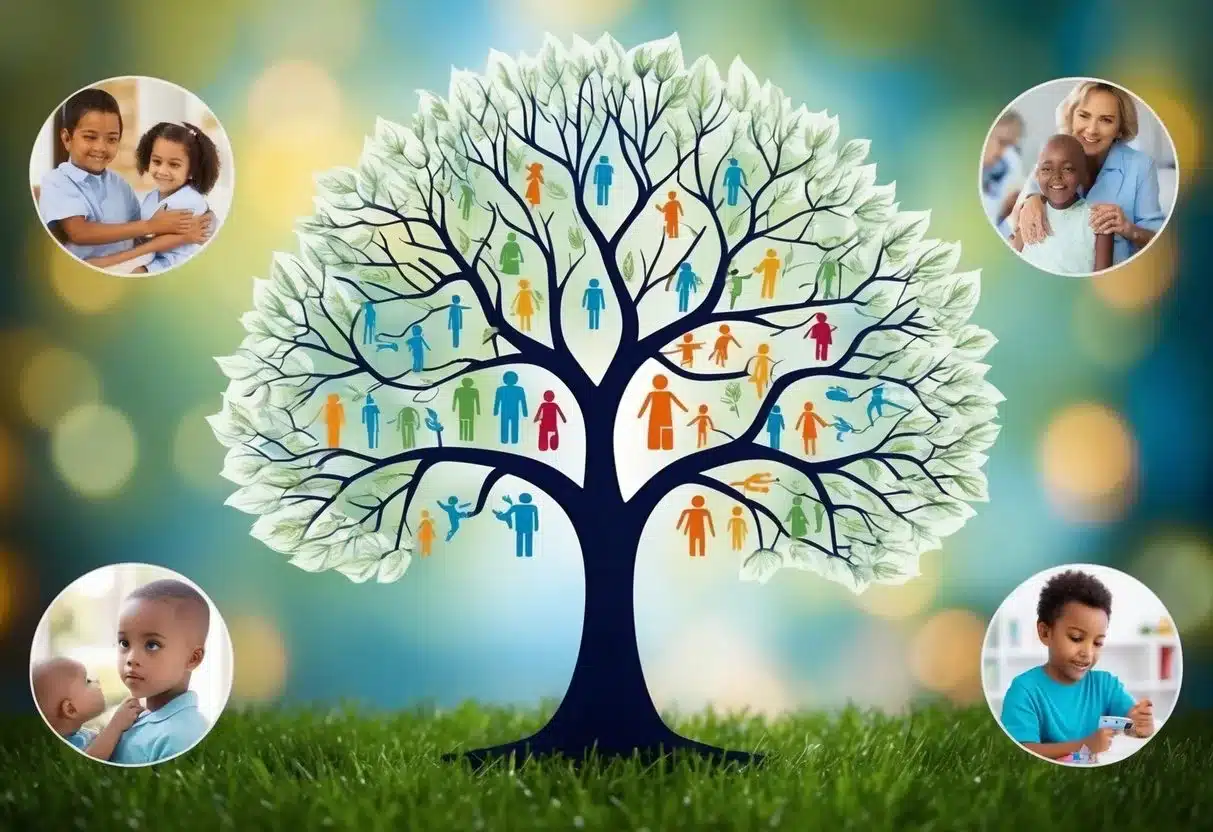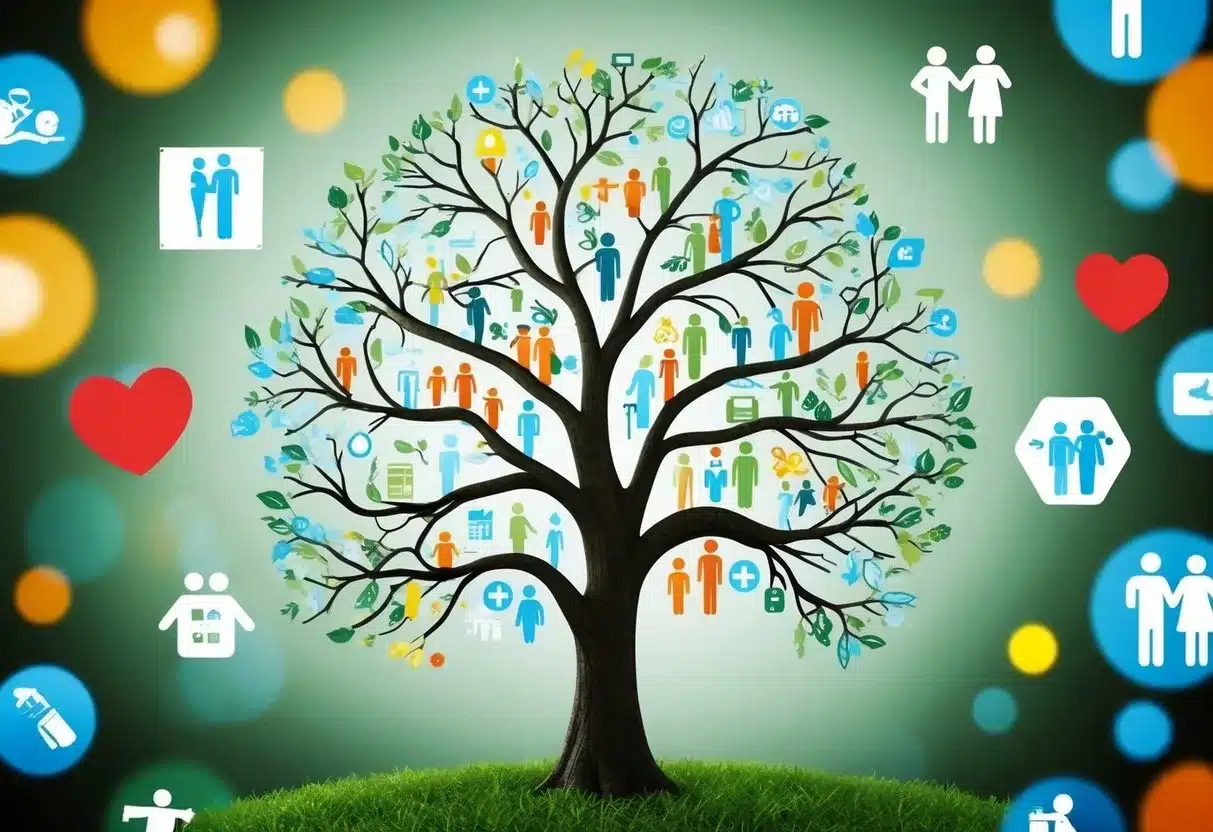Early Prevention Strategies for Better Outcomes
A child’s genetic legacy can greatly impact their health prospects from an early age. Doctors get a jumpstart on tackling potential health issues thanks to this system’s ability to flag them early on. Parents, do you know your family’s health story? This vital information can help you make informed decisions about your kids’ healthcare.

A precise family medical history helps you chart a course for better health – start tracking the trends today! This tool provides healthcare providers with a roadmap to decide if genetic tests are necessary and how to craft prevention strategies that really work. Families are equipped to make informed decisions and anticipate potential health issues when they have access to this knowledge. By spotting potential issues early, this approach can steer kids towards a healthier, happier path.
Childhood serves as a prime opportunity to take proactive steps in addressing potential health issues rooted in family medical history. Early action can prevent or delay the onset of many conditions. When families team up with healthcare providers, they can develop a personalized approach to address genetic risk factors, helping their kids thrive.
What sticks with you after reading this is the critical information you’ll want to hold onto.
- Looking to the health experiences of your relatives can provide essential clues for tailoring your child’s healthcare plan.
- What do your relatives’ health struggles have to do with you? A lot, it turns out. Knowing your family history can help you head off health problems before they even start.
- Healthcare providers tap into family health history to craft personalized prevention plans and screening recommendations that hit close to home.
One often overlooked, yet vital, aspect of health care is tracing the medical paths of our ancestors. Having a thorough understanding of your family’s health history can help you prepare for, and even prevent, certain health conditions.

Knowledge of your family’s health history puts you in the driver’s seat when it comes to managing your own health risks and developing a strategy for preventative care that’s right for you. Get ready to discover the hidden patterns that connect our genes, surroundings, and overall wellness, and uncover the secrets to a healthier, happier you.
Understanding Familial Risk
Family health history helps identify patterns of diseases that run in families. People with close relatives who have chronic conditions like cancer, heart disease, or diabetes may have a higher chance of developing those same diseases.
Genetic factors passed down through generations can increase risk. Family ties run deeper than just genes – shared daily habits and choices like what we eat and how we live also influence our risk of certain conditions.
With this info, healthcare providers can give patients a heads-up about potential health issues, allowing for earlier intervention or more regular check-ins. For example, someone with a family history of colon cancer might need to start colonoscopies at a younger age.
Impact on Personalized Risk Assessment
Family health history allows for more tailored preventive care . Doctors use this to assemble detailed risk profiles for each patient.
This information guides decisions about:
- Genetic testing
- Preventive treatments
- Lifestyle changes
For children, family health history can be especially important. Imagine being able to get a head start on tackling potential health problems before they even arise – this cutting-edge tech makes it all possible.
Your family’s health legacy, combined with other vital signs, can yield surprising insights into your own risk profile – all it takes is connecting the dots. By pinpointing the problem areas, we can craft targeted solutions to head off issues before they arise.
Communication and Education Strategies
Good communication and education are key for using family health history effectively. When families use these strategies, they can gather all the necessary info. Take charge of your health by staying on top of your medical information – it’s your key to making educated decisions and living your best life. Problems getting in the way? Let’s identify and eliminate them before they cause trouble.
Family Health History Collection
Collecting family health history starts with open talks. Families can use simple tools to record key details. Online forms and apps make it easy to save and update health info.
Gather ’round at family reunions and use the opportunity to swap stories about your ancestors’ health. Imagine having access to a repository of life lessons, lived and learned by those who’ve been around the block a few times – that’s what our older relatives offer. Major health crises, the ages when diagnosis hits, and the underlying reasons for passing on – these are the vital facts we need to focus on.
Creating a family health tree can reveal patterns. Imagine having a superpower to expose hidden dangers – that’s what this visual tool offers. Families should update their history regularly as new info comes up.
Healthcare Provider Engagement
Doctors play a big role in using family health history. They can explain what the info means for health risks. In care planning, a open and honest exchange between you and your healthcare team can make all the difference – a plan that’s truly built around you.
Patients should bring their family health history to checkups. Now doctors have a watchdog that alerts them to trouble brewing, giving them a jumpstart on fixing it. Providers may suggest tests or lifestyle changes based on family risks.
Genuine conversation happens when people truly hear each other. For genuine connections to form, doctors and patients must be on the same page. Patients should ask questions about their family health risks. Doctors don’t just treat illnesses, they can also help you prevent them from happening in the first place, and catch any potential issues before they get out of hand.
Community Health Education
Community programs teach the value of family health history. One single push and we’re engaging a sizable crowd, together, as one. Shootings can erupt anywhere – a nearby school, your office, or even the community center down the street.
Health fairs often include family history activities. People learn how to collect and use their health info. Family health tree getting you stumped? No problem – experts can come to you and lend a helping hand.
Genetic risk awareness surges thanks to public health crusades that get the word out. Family history reveals the surprising connections to common diseases that affect us all. Armed with this info, individuals can confidently chart their own health journeys.
Many local health departments host family history workshops, bringing people together to explore their heritage. Mastering health talks with relatives becomes a whole lot easier with these skills. They showcase the power of using health history to deliver more effective care.
Childhood Interventions for Long-Term Health

Early interventions in childhood can have a significant impact on health outcomes later in life. To cultivate lasting wellness, we concentrate on developing the essential building blocks that support a healthy life.
Early Childhood Mental Health
Adverse childhood experiences (ACEs) can negatively affect mental health. Strategies are in place to soften the blow and foster strength in the face of challenges.
Key strategies include:
• Trauma-informed care in schools and childcare settings
• Parent-child interaction therapy
• Cognitive-behavioral therapy for children
Early screening helps identify at-risk children. Mental health professionals can then provide targeted support. We might need to get creative with therapy, bringing the whole family together for a session or letting the kids work through their feelings with play.
Surrounded by supportive adults, kids can flourish, feeling seen, heard, and valued – a solid start to a happy and fulfilling life. This helps kids find healthy ways to deal with their emotions and reactions.
Chronic Disease Prevention
Childhood interventions can reduce the risk of chronic diseases in adulthood. They zero in on building Don’t underestimate the transformative potential of healthy habits – small, consistent changes can snowball into a lifetime of vitality and happiness. We’re often caught off guard by the stealthy approach of change. It creeps up on us, wearing the disguise of familiarity, until suddenly, everything feels different. But look back far enough, and you’ll find the first hints of transformation lurking in the early hours – a faint hum of excitement, a whisper of possibility.
Preventive measures include:
• Regular health check-ups and vaccinations
• Asthma management programs
• Early detection of genetic risk factors
Education plays a vital role. Kids soak up valuable lessons about making healthy choices that last a lifetime. This knowledge is their superpower, giving them the clarity they need to steer their path and shape their future with precision.
Communities that invest in wellness initiatives often find their residents adopting healthier behaviors and sticking to them. Families can come together over a shared love of food with cooking classes, or get their hearts racing with organized physical activities.
Nutrition and Physical Activity
A balanced diet and regular exercise are key to long-term health. At this stage, forming good habits is like planting a tree – it’s a whole lot easier when you’re young.
Effective interventions include:
• School-based nutrition education
• Family meal planning workshops
• Increased physical education in schools
Promoting healthy eating habits can prevent obesity and related health issues. Raising kids who make healthy food choices begins with teaching them about the different types of food and how much of each they should eat at mealtime.
Encouraging physical activity is equally important. At the heart of every great school is a strong athletic department, packing a punch with sports options like tennis, swimming, and more. Just plain fun – that’s what active play is all about for kids, letting their spirits soar. Imagine being able to choose from a multitude of paths, each one leading to a unique outcome. Think of it as uncovering hidden talents – when kids are involved in activities they love, they’re motivated to continue exploring and growing.
It’s a family affair – when everyone pitches in, amazing things happen. What happens at home matters, so parents who prioritize their own health and well-being set a strong example for their kids to follow.
Review of Public Health Practices
Public health practices for family health history and childhood interventions have evolved through evidence-based approaches and policy implementation. Boosting health outcomes for kids and families requires more than just treatment – it demands a proactive approach that prevents illnesses from taking hold.
Evidence-Based Approaches
Systematic reviews of family health history-based interventions have examined their effectiveness. Every analysis pores over respected journals to unearth winning formulas.
Studies on interventions typically fall into two camps: those that cherry-pick similar groups, and those that randomly assign participants. The verdict is in: RCTs provide unequivocal proof that health programs are making a significant difference.
Got a family history of health issues? These tools can help you pinpoint genetic risks so you can take action. Protecting kids and families from potential health dangers is their mission – they do this by weaving together personalized health blueprints.
Public Health Practice and Policy
Public health agencies implement family-centered health promotion programs. Young minds and bodies deserve a strong foundation, and that’s why our initiatives focus on preventing disease and stepping in early to make a difference.
programs that spring from the community itself often lead to the most meaningful outcomes. Certain obstacles are unfortunately becoming more familiar in the landscape of health promotion. In their own neighborhoods, kids and families fall prey to these destructive forces.
Policy changes support the integration of family health history in public health practice. genetic testing and counseling are now within reach, thanks to dedicated funding for these vital resources.
Families can turn to health departments for support in gathering and understanding their family’s medical past. With access to clear health information, parents can now take charge of their child’s well-being with confidence.
Screening and Prevention Strategies

Family health history plays a key role in identifying risk factors and guiding prevention efforts. If you want to get ahead of the health curve, it’s time to bring out the big guns. Regular health screenings, empowered with education and genetic testing, can help you sniff out and tackle health issues before they become major concerns.
Regular Medical Screenings
Regular check-ups are vital for catching health problems early. As part of your regular health check-ups, you can expect a quick round of tests, including checks on your blood pressure, cholesterol, and blood sugar to keep you on track.
As kids grow, pediatricians carefully chart their progress, benchmarking every major milestone and minor achievement. Their health services extend to include life-saving vaccinations, safeguarding individuals against a range of diseases.
Adults may need additional tests based on age and risk factors. Essential health checks can include a mammogram to examine breast tissue, a colonoscopy to inspect the colon, and a prostate exam – all key to preventing small issues from becoming big problems.
Assessing risks takes a step back to look at the whole scenario. During routine primary care check-ins, healthcare providers get a chance to flag those who would profit from additional screenings or preventative steps.
Healthy hearts start with education – knowing the ins and outs of cardiovascular wellness can be a lifesaver.
With heart disease snagging the top spot as a leading cause of death, staying educated on the topic can literally be a lifesaver. To really thrive, we need to pair smart food choices with regular physical activity – it’s a one-two punch for optimal health.
Key topics include:
- Maintaining a healthy weight
- Quitting smoking
- Limiting alcohol intake
- Managing stress
Doctors can provide personalized advice based on a patient’s family history of heart disease.
Youngsters can reap the benefits of heart healthy habits when schools and community programs step in to guide them.
Imagine being able to foresee and prevent devastating health problems. That’s exactly what genetic screening offers – a powerful tool for building a healthier future.
Thinking about your family’s medical history? Genetic testing can fill in the blanks, revealing inherited risks for specific diseases. Armed with this information, doctors can craft personalized prevention plans that hit their mark.
Think of genetic screenings as a proactive step in managing your health. You’ll typically be tested for:
- BRCA1 and BRCA2 mutations (linked to breast and ovarian cancer)
- Lynch syndrome (associated with colorectal cancer)
- Familial hypercholesterolemia (causes high cholesterol )
Family health history data can guide decisions about which genetic tests are most appropriate.
A genetic risk doesn’t seal your fate; many people with the same risk go on to live healthy lives, free from disease. Rather than waiting for things to get worse, why not take proactive steps to start making a positive impact now?
These days, tech is effortlessly woven into the fabric of family life – whether that means reviewing medical records online, scheduling vaccinations, or sending swift TXT updates to anxious loved ones.

Say goodbye to scrapbooks of scribbled medication schedules – today’s families are harnessing the power of technology to shape their own healthy futures. Imagine having your entire medical history at your fingertips, and being able to get advice from doctors without leaving your house – that’s the reality with modern digital tools. The floodgates of healthcare access have opened, and families are now better positioned to take control of their health with confidence.
Telehealth Services
Telehealth services allow families to consult with doctors from home. Video calls let patients show symptoms and get diagnoses without traveling to an office. Folks stuck in remote areas or tethered to their homes will breathe a sigh of relief with this solution.
Telehealth also enables quick follow-ups and medication checks. Patients can message their doctors with questions between visits. Chatting regularly helps us get on the same page and stay connected. Sets the stage for a longer, healthier life, one step at a time.
Some telehealth platforms offer group sessions for families. These let multiple family members join a call to discuss shared health concerns. Bring the clan together under one medical roof, and the benefits of team care become apparent – it’s care for the whole crew!
Digital Family Health History Tools
Digital tools make it easy to record and update family health histories. Many apps let users create family trees with health info for each relative. Looking at this data helps us pinpoint genetic red flags that have been passed down.
What if you could uncover genetic tests that resonate with your family’s story? These cutting-edge tools make it possible. They may flag when someone should get screened earlier for certain conditions.
Family trees are now being linked to medical records on certain platforms. With this information, doctors have a patient’s entire health story at their fingertips. Care plans become more effective when they’re rooted in a deep understanding of each family’s particular situation.
The crisis of unequal healthcare affecting marginalized populations can’t be swept under the rug – it’s time for honest discussions and concrete action.

You can find health disparities playing out in communities and families all around us, often with devastating consequences. Early action can shrink these divides. Promoting healthy lives depends on more than just doctors and medications – it relies on strong family bonds and community support.
Family-Centered Approaches
Family-centered approaches put families at the heart of health interventions. By combining these specialized tools, we can drill down into the specifics and craft formidable plans of attack. In the great balancing act of growing up, family provides the stability and love that helps kids find their footing. . Helping parents and caregivers build strong foundations is their top priority. Cozy living spaces that foster well-being start with a solid foundation: a home that supports your health. .
Programs may include:
- Parent education classes
- Home visiting services
- Family counseling
These interventions often focus on nutrition, safety, and emotional support . Families get the tools they need to tackle tough health issues head-on. From kids to parents, everyone benefits when these methods focus on supporting the entire family unit.
Promoting Health Equity
Health equity means everyone has a fair chance to be healthy. equity efforts must reckon with the heavy hand of social circumstances A health profile is shaped by many interconnected elements. We’re talking about the fundamental stuff: a good education, healthcare that’s actually available, and neighborhoods where you feel safe walking around.
Grassroots initiatives hold significant power in creating a more equitable environment, by fostering community-wide change. These may include:
- School health programs
- Local health fairs
- Neighborhood improvement projects
These efforts aim to create supportive environments for all families. They often target areas with high health disparities. When we boost community conditions, we can inch the quality of life, narrowing health disparities as we go.
Impact on Health Policy and Management
Family health history shapes healthcare policies and risk management strategies. With this info, stakeholders can pinpoint impactful initiatives and chart a course for meaningful change. Skillful hands, gentle hearts – it’s the fusion of these two that elevates care to a deeply personal level. Only by shrugging off outdated concepts and embracing trailblazing ideas can we genuinely move forward.
The healthcare policies that affect us are, to a large extent, guided by our family’s medical past.
How does your family’s health heritage shape your own? Discover the impact of your family’s medical past on your current and future health. The stakes are high, and this element strongly sways healthcare policy decisions. With its help, we can pinpoint the groups that are more prone to certain health issues. Building on this foundation of knowledge, we take the first step. Thorough applicant evaluation is a top priority in any organization Active defense mechanisms couple with safeguards to drastically reduce the likelihood of accidents.
To get the most bang for their buck, public health agencies pour over family history data to inform their resource allocation decisions. Genetic risks vary from community to community, and researchers can homed in on those with a higher incidence of specific diseases. This way of doing things translates to a smarter allocation of healthcare dollars.
The development of coverage policies relies heavily on a family’s medical history, allowing insurers to create more accurate and effective policies. For individuals with genetic profiles that raise red flags, healthcare providers may jumpstart preventive care by adding more frequent check-ups and screenings to their routine.
Risk Management through Family History Awareness
Knowing one’s family health history is a powerful tool for risk management . Healthcare providers develop a customized blueprint for each patient’s care based on this vital information. Doctors who recognize higher genetic risks in their patients can pinpoint when earlier or more frequent check-ups make sense.
Patients who are aware of their family health history can make informed lifestyle choices. To sidestep potential dangers, they’ll often make a conscious effort to eat smart and stay active. Healthy habits and smart decisions can have a dual impact, leading to both better health and smaller medical expenses.
Healthcare systems are implementing family history tools in electronic health records. Genetic risk analysis just got a whole lot easier – and more accurate – thanks to an innovative integration that helps parse population data.
Frequently Asked Questions
Family health history plays a crucial role in shaping childhood interventions and preventive care. What do genetic factors and shared lifestyle habits have in common? They can impact a child’s health, and understanding them can make all the difference in delivering effective care.
When gathering info on your family’s health, what details really matter?
When documenting family health history, include information about close relatives’ medical conditions, age of diagnosis, and cause of death if applicable. Note any chronic diseases like cancer, heart disease, or diabetes.
Get specific about your daily routine, capturing the good, bad, and everything in between – from food diary to exercise log to air quality checks. Include details about ethnic background, as some health conditions are more common in certain populations.
What role does your family’s medical past play in warding off common diseases?
With a grasp of your family’s medical history, you’ll be better equipped to recognize risk factors for particular diseases that run in your family. For example, if heart disease runs in the family, doctors may recommend earlier screenings or lifestyle changes for children.
Cancer can already be woven into the fabric of your family’s story, so you know its power firsthand. Genetic screening or more regular check-ins with your doctor might be the next step in this journey. This information serves as a rallying cry for creating a tailor-made prevention plan that acknowledges and addresses a child’s unique vulnerabilities.
By being upfront about your genetic health, you can rest easier knowing your healthcare provider has a clearer picture of your medical story.
Doctors aren’t mind readers, but they can make more informed diagnoses if patients share their genetic health history with them. This lets healthcare providers suggest the right tests and precautions for their patients based on their genetic profile.
By harnessing the power of this data, healthcare professionals can discover hidden patterns and spot signs of genetic conditions before they cause harm. Healthcare providers are now equipped to proactively advise patients on life-affirming habits and techniques for postponing or even dodging diseases.
In what ways can early childhood interventions be tailored based on family health history?
Early interventions can focus on preventing or delaying the onset of hereditary conditions. For instance, children with a family history of obesity might receive specialized nutrition education and activity programs.
Those with a family history of mental health issues could benefit from early stress management techniques. Tailored interventions may include regular check-ups, specific screenings, or targeted education about risk factors.
Understanding your family’s health history is like holding a blueprint for your body’s future – it helps identify potential landmines and reveals which chronic illnesses you’re most likely to face.
Chronic illnesses often have a strong family connection. By exploring your family’s health history, you can identify your own risk factors and take proactive steps to protect your health. Healthcare providers can now catch warning signs early, and kick-start treatment before symptoms get out of hand.
What if your genetic makeup held the secret to optimal medication? It’s a possibility, as some treatments prove more effective when tailored to an individual’s genetic profile. This approach enables health professionals to create robust plans that actively prepare for possible setbacks or concurrent conditions.
What lifestyle modifications might be recommended for children with a family history of certain conditions?
Children with a family history of heart disease might be encouraged to maintain a heart-healthy diet and regular exercise routine. Got a family history of diabetes? You’ll want to pay attention to the expert guidance on blood sugar control and nutritious meal planning.
For families with a history of skin cancer, sun protection measures might be emphasized. Regular physical activity and stress management techniques could be recommended for children with a family history of mental health issues.